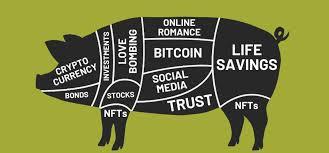
I get tons of spam and scam emails daily. Couple years ago, one piqued my curiosity. From some “Zodiac” outfit offering me $750,000 to re-donate. (I do have a philanthropic fund.) I found a Dutch Zodiac website listing the email writer as a staffer, so I replied, “tell me more.” Then a message from the boss explained he’d won a huge sum in a California lottery — more googling verified that — and was redistributing it to worthy causes.
Next step was opening an account in a major UK bank. But when it couldn’t be confirmed by the bank, I bowed out. “Zodiac” soon proved merely the first of many similar propositions.
A Kansas bank chief had a worse experience. Making millions in crypto — until the website involved proved fraudulent, and the $47 million he wound up embezzling from his bank collapsed it, gaining him a long prison sentence.

He was a victim of what’s called “pig butchering” (deriving from a Chinese expression). Incidental contact by some overseas person grows into an ongoing long distance relationship, gradually establishing trust. Then an “investment opportunity” is broached. And the pig is butchered.
The calls generally come from compounds filled with people who are themselves scam victims. Often lured by seemingly legitimate and attractive job offers, they find themselves actually enslaved prisoners, forced to do pig butchering, on pain of punishment. The compounds can be huge, with supermarkets, brothels — and torture chambers. But also, desperate people can be hired for such awful work with scant deception.

This workforce may number up to a million or more. So this is a very big industry — rivaling the international drug trade. Global takings are estimated at half a trillion dollars a year (Americans losing probably $50 billion). In its key centers — Cambodia, Laos, Myanmar — it accounts for about half of GDP. Much has its wellsprings in China, whose nationals often control such offshore enterprises. China has tried to crack down, arresting hundreds of thousands, but its authorities are swamped by the magnitude of what’s afoot.
Meantime, the other mentioned countries are not exactly noted for rule of law, so the fraudsters are able to operate there with relative impunity, or even the connivance of corrupt regimes, which have become the equivalent of narco-states. The challenge for global law-enforcement is exacerbated because whereas illegal drugs can at least be interdicted and confiscated, pig butchering entails nothing like that. Still further, transactions are typically in cryptocurrency, whose very raison d’etre includes eluding government purview. (Trump’s reckless loosening of crypto regulation will aid pig butchering.)
That Kansas bank guy’s story is scarily telling. Surely he, of all people, should have known better. His being duped shows how devilishly cunning such scams can be. Often the callers operate according to a sophisticated manual, to probe for and then exploit personality vulnerabilities. People both affluent and lonely are particularly juicy porcines.

Modern technology, of course, gives scammers powerful new tools. Those phony messages or calls from your grandson in trouble and needing quick cash get ever more convincing. Old-time “Nigerian prince” scams now seem pathetically crude. One employee of a big finance company had a zoom with his familiar colleagues and boss instructing him to make a $25 million transfer. Turned out all those people he was talking to onscreen were deep fakes.
So always be skeptical and careful. Don’t click on any links you can’t be absolutely sure about. Even if offering you $750,000.
This posting was greatly informed by coverage in The Economist’s February 8 issue.
